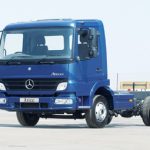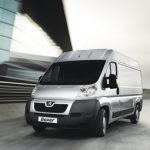MAN’s world changes
The MAN family is growing faster than Jacob Zuma’s (although, thankfully, in the case of the German commercial vehicle company, this expansion is not costing South African taxpayers anything). It has, however, necessitated a major global restructuring exercise – which has some significant implications for South African customers.
Thomas Hemmerich, the outgoing CEO of MAN Truck & Bus SA, puts it nicely when he points out that, in recent years, the global MAN group has gone on a shopping spree. “We went around the world with our basket and bought some excellent companies,” he says.
The most high-profile acquisition, certainly in terms of South African operators, was undoubtedly that of Volkswagen Truck & Bus (now called MAN Latin America) in Brazil, a move that gave MAN access to the vast South American bus and truck market. “Volkswagen is the commercial vehicle market leader in Brazil,” comments Hemmerich, adding that this is a highly protected market. “In Brazil you must have 60% local content, otherwise the taxes are so high that you cannot be competitive in the domestic market,” he notes.
According to MAN’s latest annual report, MAN Latin America’s existing network of dealers will sell the heavy MAN Trucknology Generation trucks in Brazil, with the adjoining Latin American countries following later. In the medium term the economical MAN D08 common-rail engine will also power the VW Constellation. The report reveals that, in the long term, the development of joint truck and bus platforms is planned.
MAN has also taken its shopping basket to India and China. It has been active in the former market since 2006, when the MAN Force Trucks joint venture was established in Pithampur. At the end of 2008 MAN increased its share of the joint venture from 30 to 50% and also took over more responsibility for the continued expansion of activities in India.
Its foothold in the Chinese market has come thanks to a partnership with the Chinese truck manufacturer Sinotruk, a leading manufacturer of heavy-duty trucks in that country. MAN holds 25% plus one share, giving the company access to the world’s biggest and fastest-growing truck market. The two companies are jointly developing a truck series based on MAN technology. Dr Frank Hiller, executive board member marketing, sales and service of MAN Nutzfahrzeuge, has revealed exclusively to FOCUS that this truck will come to South Africa in 2012.
According to Hemmerich, MAN’s acquisition trail has seen it emerge as a “multi-brand organisation” comprising scores of sales regions. In fact, prior to the global restructure, there were no fewer than 11 sales regions, all reporting to Dr Hiller. “It has become uneconomical to coordinate all the sales regions, plus the marketing function has not occupied the strategic position that it deserves,” says Hemmerich.
Thus the decision was taken to restructure the previously large and cumbersome organisation into a leaner group with considerably more emphasis on marketing and globalisation. The first step was to consolidate the sales regions – from 11 down to seven. On a local front, the most significant change was the merging of two regions: Middle East and Africa.
Hemmerich says that he has been pushing for this merger for two years. “There are huge synergies between the Middle East and Africa; the customer requirements are exactly the same,” he notes. Markus Geyer, who previously headed up the Middle East sales region, will be CEO of Africa/Middle East, and he will travel throughout the region.
The seven regions are Germany, Western Europe (including the United Kingdom and Scandinavia; headquartered in Vienna), Eastern Europe, Commonwealth of Independent States (CIS), Africa/Middle East, Asia Pacific and Iberia. Iberia was not merged into Western Europe because it requires dedicated focus. “This market was hit the hardest by the economic meltdown. We are focusing on achieving a turnaround; we are determined to grow the business in that region,” reveals Hemmerich.The CIS sales region is also an interesting one, in that it includes Russia, where MAN has grown its market share to the point that it is now the number one Western European truck importer.
While the number of sales regions has been consolidated, there are more sales, marketing and after-sales departments than before, and two of these are especially significant to South African operators. The first is sales – Hemmerich has been promoted and will head this up. In his new capacity as senior vice president sales, Hemmerich will be responsible for global sales for the MAN Nutzfahrzeuge Group and he also heads up business globalisation, so he’s responsible for the sales strategy of the aforementioned operations in China and India. In his new role, Hemmerich is even more determined to deliver a quality product. “We are employing 60 additional engineers in Munich to analyse any customer complaints and implement subsequent engineering changes,” he reveals.
The second significant department is that of business units, international key accounts, MAN Rental, TopUsed, Components and MAN finance and leasing. The reason it’s meaningful is because this department is headed up by Geoff du Plessis, a man who is extremely well known to virtually all local operators (he’s been in the trucking business longer than some of our readers have been alive). Du Plessis was CEO at MAN Truck & Bus SA prior to Hemmerich’s appointment on July 1, 2008. Prior to that he was with Mercedes-Benz for many years.
Du Plessis was most recently CEO and managing director of MAN Northern Europe, a sales region which has now been incorporated into MAN’s Western Europe sales region. One of his particularly interesting areas of responsibility is that of MAN Rental. “MAN recently acquired a majority stake in the truck rental company EURO-Leasing GmbH (25.1% initially; that’s now risen to 50.1%). In Europe, the rental business is becoming more and more important. MAN Rental now has 4 000 truck tractors and 6 000 trailers. Operators on that continent want to be able to adapt their capacity quickly. Operator margins in Europe are two to three percent; if you have fixed costs and you lose a major contract, you can end up bankrupt very soon,” notes Hemmerich.
In other news of specific interest to South African operators, another well-known South African, Dave van Graan, has been appointed centre leader for Middle East (in the new MAN world, there are six centres in the Africa/Middle East region, of which Middle East is one).
The restructuring, officially effective July 1, means that Hemmerich will be lost to South Africa sooner than expected – he’d anticipated remaining in South Africa for at least three years. While it would obviously have been sheer lunacy for him to decline the promotion, he says that he is sad to leave South Africa.
“In all honesty, this is a small market in global terms. But I have learnt more in South Africa in the past two years than I could have learnt in Germany in 10 years. That’s because all the major competitors are present in this country; you learn about all the rival products from around the globe very rapidly. South Africa is a melting pot of all the truck and bus producers globally,” Hemmerich maintains.
Despite the fact that this is a small market, Hemmerich notes that there is considerable potential on this continent for the rugged TGS Worldwide (WW). Hemmerich believes that some European truck producers have a tendency to over-engineer their products. “Most of the African markets are not willing to pay for those products because they are too expensive. Even if they are willing to pay for the product, these trucks cannot be adequately serviced and maintained,” he notes. That’s not the case with the TGS WW, which is essentially a workhorse. “The TGS WW is a European product adapted to African markets. Designed specifically for countries where operators transport heavy loads in dusty, tough conditions, it can fill a gap on this continent,” he comments.
The new MAN TGS WW, which replaces the TGA WW, enjoyed its world premiere at the Bauma construction show in Germany earlier this year. The TGA WW has achieved considerable success since its launch in 2003, largely because of its load-carrying capacity and ability to go pretty much anywhere. The TGS WW should attract an even greater fan base; at Bauma it received rave reviews, largely because of its improved levels of comfort and safety.
The arrival of this vehicle (we believe it will come here as soon as September this year) is big news for local operators. Even more noteworthy is the fact that the CEO of the entire Africa/Middle East sales region (Geyer) will be supported by a local CEO, who will be responsible for southern Africa only. He has yet to be appointed.
Hemmerich stresses that MAN is mindful of the fact that, especially in South Africa, the truck and bus game is a people’s business. “All the products are comparable. I can tell you a long story why a MAN is better than a Mercedes-Benz. But you know as well as I that the products are very similar. It’s all about the people and the after-sales support,” he says in his characteristically honest fashion.
Southern Africa is unique in getting its very own CEO; this won’t happen in any other areas. “We believe that South African customers would welcome the appointment of a local CEO who, because he is based in this country, is constantly accessible to operators. Customer proximity is a priority,” says Hemmerich.
This is a good move. While Geyer has an outstanding track record and will certainly find favour with local operators, the practicalities of the vast region under his control mean that he will be flitting in and out of the country – he will have absolutely no choice. A local CEO, on the other hand, will be here to deal with customer requests on a daily basis. Customers want that. Given the value of their investments, they’re also getting precisely what they deserve.
Published by
Focus on Transport
focusmagsa




